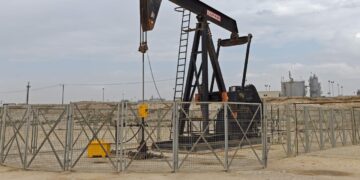Copper prices fell for the fourth straight day on Thursday as tensions between the U.S. and China flared as House Speaker Nancy Pelosi wrapped up her visit to Taiwan, an island that China claims as its own territory.
China serves as one of the world’s biggest metals consumers. While rising geopolitical tensions look to be an unlikely catalyst of a further selloff in copper, investors in base metals used in construction projects still worry a slowdown in global economic growth will dampen demand.
“Its recent drop has added to wider concerns about a possible global recession,” said Boris Ivanov, global commodities expert and founder at Emiral Resources on Wednesday. “The lackluster economic growth in Europe, US and China and deteriorating macroeconomic backdrop will damp demand for metals like copper, and its market performance will depend on how rate rises and fiscal stimulus measures pan out.”
Three-month copper on the London Metal Exchange fell 3% to $7677.50 a ton on Thursday, booking a fourth straight day of losses, according to Dow Jones Market Data. While on the New York Mercantile Exchange, copper contracts for September delivery
HGU22,
lost 4 cents, or 1.1%, to trade at $3.43 per pound. In Asia, the most-traded September copper contract declined 2.2% to close at $8,701.13 a ton.
U.S. House of Rep. Speaker Nancy Pelosi arrived in Taiwan on Tuesday on a trip she said “honors America’s unwavering commitment to supporting Taiwan’s vibrant democracy” but also didn’t contradict China’s claims over the self-ruled island. Pelosi was the most senior U.S. politician in 25 years to visit the island.
The visit, in defiance of Beijing and despite warnings from Biden, prompted China to announce a series of military operations around Taiwan Strait, escalating tensions between Washington and Beijing.
Read more: Why China-Taiwan tensions moved to the forefront of financial market worries
Commodity prices, particularly metals, have fallen sharply as demand has dipped due to weak consumption from the top market, China, but also from the impact of monetary policies tightening around the world to battle rising inflation, according to Ivanov at Emiral Resources.
The Federal Reserve raised its benchmark interest rate by another 75 basis points a week ago Wednesday in an effort to tame the inflation. Fed Chairman Powell attempted to assure Americans that the U.S. probably isn’t in a recession right now, even though the second-quarter GDP data, which was released a day later showed the economy shrank by 0.9% on an annualized basis in the three-month period from April through June, intensifying fears that the economy already might have slipped into recession.
Copper in July tumbled to its weakest level in 20 months as global recession fears and China’s disappointing GDP and trade data continued to weigh on investors’ sentiment. China is one of the largest consumers and importers of refined copper, and relies heavily on copper resources to meet its demand for construction and electric vehicles production.
China’s factory activity unexpectedly contracted in July after bouncing back from COVID-19 lockdowns the month before, a survey by the National Bureau of Statistics showed on Sunday. The official manufacturing purchasing managers index fell to 49 from 50.2 in June, dropping below the 50-point benchmark mark which indicates a contraction.
Another data showed that sales at the country’s top 100 real-estate developers dropped 39.7% year-over-year in July, while sales were down 28.6% from a month earlier.
“Over the last two decades, China’s infrastructure push has been fueling demand for commodities, especially metals like steel and copper. China imported over 373,000 tonnes of refined copper in June, its highest monthly tally this year,” explained Ivanov. “However, its economy has been impacted by its zero-COVID policy and subsequent spate of lockdowns across major manufacturing hubs and urban centers and trouble in their debt-ridden property market. The sector, a key source of demand for metals, remains delicate.”
MarketWatch reported last week that China’s real estate crisis will cause a more severe downturn in base metals prices over the second half of the year as COVID-19 lockdowns have severely disrupted property constructions, while many home developers are still trapped in a crippling debt crisis.
Meanwhile, precious metals futures were mixed. Gold futures expiring in December
GC00,
GCZ22,
jumped $15, or 0.9%, to trade at $1,791.60 per ounce on Thursday. Silver for September delivery
SIU22,
fell 5 cents, or 0.3%, to $19.96 per ounce, according to Dow Jones Market Data.
Read the full article here








